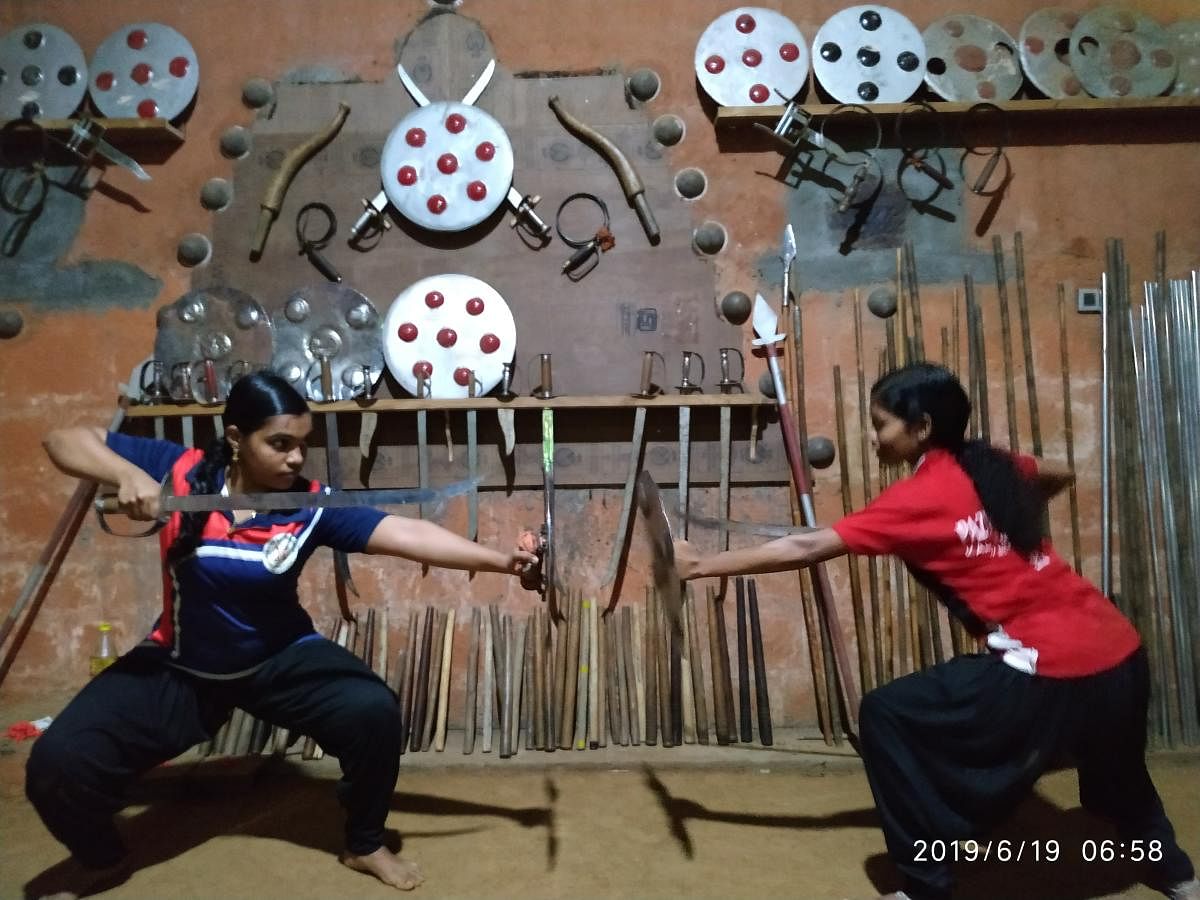
Pazhassiraja Kalaripayattu Academy, tucked in a quiet, picturesque corner of Peravoor, a small town in Kannur district, north Kerala, overlooks River Baveli and Aralam Wildlife Sanctuary. A group of friends set up the academy in 2010 to revive Kalari, the traditional Indian martial art that originated in Kerala.
The academy is named after Pazhassiraja, one of the earliest freedom fighters of India, acclaimed for his martial exploits. From the time the academy was set up, Gurukkal Sreejayan, the master Kalari trainer, runs it single-handedly. From roping in children from nearby areas to training them every day from 5.30 am to 7.30 am, he does it all. He teaches Kalari free for kids, and today, 50 girls and 33 boys learn Kalari at the academy.
“Girls want to learn Kalari to be fit, healthy, defend oneself and break free from their constricted lives,” said Sreejayan. The place where Kalari is taught is at a low level to keep the temperatures cool. Models of the most important postures that define Kalari, such as that of a peacock, an elephant, a cat and others, are displayed on the walls. Wooden and metallic weapons — swords and shields — are kept at the fag end of the stretch. Every day, before practice begins, lamps are lit and prayers are offered.
Prized pair
Kalari is defined by steps (Chuvatu) and postures (Vadivu). It’s the postures that form the basis of Kalari. There are four stages. In the first stage, ‘Maithari’, a student’s body is toned. In ‘Kolthari,’ the second stage, students learn to use wooden sticks. As I watched the practice, senior students Anushree and Archa took centre stage.
Archa swung her sword in the air, held the shield tight and marched towards Anushree, her opponent. Alert, Anushree held her sword in grip and fielded her attack deftly. Archa swirled her sword and went charging while Anushree ducked and struck her back. The attacks and counter attacks continued. Occasional yells of the combatants coupled with the sharp striking of the swords rent the air.
This is ‘Angathari,’, the third stage in Kalari where students use metallic weapons. Archa and Anushree briskly let go of their weapons and Anaswara and Keerthana came to the fore. Keerthana walked speedily and kicked Anaswara’s back. Anaswara somersaulted and attacked her opponent. She gave a blow, the two locked their hands, then broke free and jumped in unison.
Suspended in mid air, both continued their strikes and blows weaponless. This is ‘Verumkai,’ the fourth and the final stage of Kalari. Here, one fights and defends empty handed. Even as I watched the practice, the performance of Archa Babu and Anushree piqued my interest. “They are the prized pair,” said Sreejayan. Eighteen-year-old Anushree is a BSc (Zoology) student, at Nirmalagiri College, in Kannur.
Though body weight issues drove Anushree to learn Kalari, she soon fell in love with it. “Gradually, I stopped being conscious of my body weight,” she said.
Peaceful warriors
While Malala Yousafzai inspires her, Anushree wants to be a cop and fight crimes against women. Attributing her new-found confidence to Kalari, Anushree says she wants to teach it to small girls. She is also learning Kalari massage from Gurukkal Sreejayan. “Massage and Kalari training go together,” said Sreejayan.
Broadening Kalari’s scope, Archa Babu, the brilliant companion of Anushree, said: “My day begins and ends with Kalari practice.” Archa Babu (17) is a 12th standard student and has been learning Kalari for the past ten years. While most of her classmates fizzle out after a few classes, Archa continues to be active.
Archa pointed how unlike before she responds when ‘eve-teased’. Realisation that one should respond and protect oneself when ‘eve-teased’ is liberation. It’s this that Kalari teaches the girls.
While there are the determined senior students, there are also the six-year-olds who are learning Kalari with equal gusto.
The plus of learning the artform is manifold. Parents have noted improvement in their children’s health, concentration and behaviour after training in the art.
Then there’s Neelambari who was terrified of darkness. “I am not scared of darkness anymore,” said Neelambari.
The 12-year-old girl from Kakkayangad is now a national-level medal winner in Kalari. “Kalari isn’t about fighting but minimising confrontation and living a long, healthy and happy life,” noted Sreejayan.
Essentially, a Kalaripayattu practitioner is a peaceful warrior. The students have performed at Jalandhar, Punjab, and Bhopal under ‘Ek Bharat Shresht Bharat’ programme in 2018.
They have enthralled audience across India and won several district, state and national awards. Recently, six students from the academy received the Khelo India Scholarship. From overcoming a fear of darkness, shedding negative body image to embracing life in its entirety, Kalari has left an indelible impression on these students.